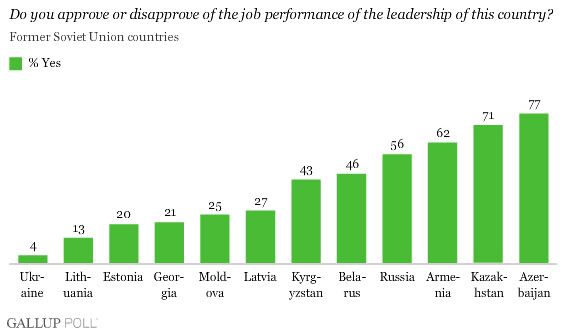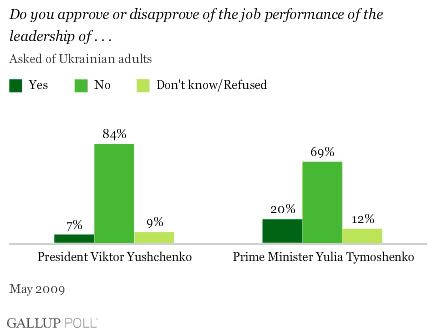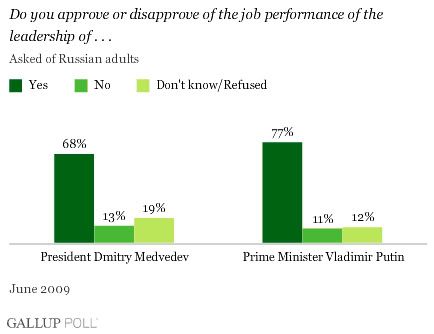The Orange Revolution in Ukraine, which began with a dispute over the 21 November 2004 run-off vote between the leading presidential candidates, ended by installing Viktor Yushchenko, the Western favorite who cried fraud, into presidency on 23 January 2005. Ian Traynor of the Guardian put the price tag of the Orange Revolution at about $14 million.1
So, what is the Ukrainian opinion of Orange Revolutionaries today, a little over four years after the Orange victory? According to Gallup, it is, to put it mildly, jaundiced:
Eighty-five percent of Ukrainians in May told Gallup they disapprove of the job performance of their country’s leadership, up from 75% in 2008 and 73% in 2007. The 4% of Ukrainians who approve is not only the lowest rating Gallup has ever measured in former Soviet countries, but also the lowest in the world. (emphasis added, “Approval Ratings in Ukraine, Russia Highlight Differences,” Gallup, 31 July 2009)
That’s the voice of the people whose leadership came to power through a color revolution. In contrast, the top Russian leaders — who didn’t come to power through the same colorful path and are actually known for their vigorous opposition to color revolutions — apparently enjoy high levels of popular support, according to the same Gallup survey.
Orange Questions
. . . for imperialists:
“Isn’t ‘democracy assistance’ for color revolutionaries a waste of money?”2
. . . for leaders of nations bombarded with “democracy assistance”:
“Isn’t the best way to make the opposition unpopular sometimes to put them into power?”
. . . for opposition leaders favored by the West:
“Isn’t the quickest path to the dustbin of history to vault into power, leveraged by ‘democracy assistance,’ without knowing how to run anything bigger than your little political faction?”
1 FYI, the FY 2009 funding for the “governing democratically and justly” programs targeting Iran is $65 million: “The $65 million for Iran is equal to roughly one-third of the FY 2009 funding allocated for the entire sub-Saharan African region, excluding Sudan” (David Price, “Global Democracy Promotion: Seven Lessons for the New Administration,” The Washington Quarterly, January 2009).
2 E.g., “USAID has spent well over $9 billion over the past two decades to promote democratic governance in more than 100 countries. For the past few years, the annual investment in USAID democracy assistance programs has grown to about $1 billion dollars, and the median budget for such countries is now approximately $5 million” (US AID, “Initiatives to Improve Evaluation of USAID DG Assistance Programs: Strategic and Operational Research Agenda [SORA]”). And that is just one US government agency, not counting others, let alone NGOs, real or nominal. By the way, do you know what Freedom House is saying about the Barack Obama administration’s “democracy assistance” budget: “Freedom House is encouraged by the request to increase funding for democracy and human rights by nine percent at this critical time” (emphasis added, “Administration Takes Strong First Step with Democracy Budget Request,” Freedom House, 1 July 2009)?



